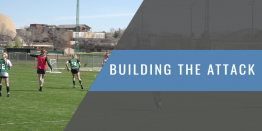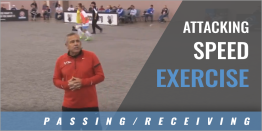| The Case For The High School Coach
Provided by NSCAA
My soccer career has taken many paths. i started as a volunteer youth Loden, which led to a spot on the local board of directors. Less than a year later, I found myself as the president of a club with 2,000 players. I took on some select coaching as my own kids moved through the program and then found my way onto a high school staff. After two years, I was the head coach of that program. I became involved in my high school coaches' association and spent time as the president of that organization, and I continue to serve on the state association's soccer advisory committee. I took on the role of state technical director for the NSCAA and I am currently running for an NSCAA board of directors spot. So why am I not being considered for a college position?
Then I spoke to some college coaches I worked with and discovered that being a high school coach carries absolutely no (or very little) credibility with college or university personnel offices. How can a high school coach build a solid resume and not be considered for a higher-level position? Why is a club coach or a graduate assistant looked at more favorably than a high school coach with years of coaching experience? After taking the time to investigate this lack of interest, I believe it all comes down to education. I have earned the NSCAA National, Advanced National, and Premier Diplomas. So why, if education is the difference, was I still not receiving some attention? Again, I believe it comes down to education and the perception that the high school coach does not have the knowledge base. If you coach a select team, there are minimum requirements to be a select coach. Most states require a USSF "D" license to coach U-14 and above. What is the requirement for a high school coach? If you answered "nothing," you are correct. The NSCAA has put together a High School Coaching Diploma, which I have also taken and found to be a very valuable educational opportunity. Why are we, as high school coaches, not demanding that our profession have an educational requirement? Many schools struggle to find a coach for high school soccer so they find a warm body to throw in the position. This practice hurts every one of us as professionals. There are far too many untrained coaches in the high school ranks, so it's no wonder our profession struggles for credibility. It boils down to the fact that we do not demand excellence of ourselves. There are, of course, many excellent high school coaches who would excel if they were given an opportunity to coach collegiately. A lot of high school coaches are educators, they are flexible and they adapt quickly. The argument that a high school coach does not know how to recruit, or that they do not know the NCAA or NAIA rules, does not wash either. High school coaches recruit every day in their schools and communities just to get kids to try the game of soccer. How long does it take to read a rule manual and learn the ropes of the NCAA or NAIA? My answer to that is not very long. Let's take a look at recruiting. Why do colleges think that high school coaches do not recruit? Soccer is not the sport of choice in many American cities. Young kids are brought up to believe they need to play football or basketball - those are "our" sports. As coaches, we have a chance of getting young girls to play our sport, but young boys present a recruiting battle; we have to sell soccer. Isn't that what a college coach does? They sell their university and high school coaches sell their school and their sport. And I think the high school coach has a harder sell. Another argument against the high school coach is that they may not know the landscape of soccer in that area or region. If there is a job in the state where the high school coach is working, I would argue that they have a pretty good knowledge base of who the state college coaches are and which programs have had success over the past few seasons. If the high school coach is looking for a position in a new state, who better to connect with the state high school coaches than a coach who has walked in their shoes? Getting to know the other college coaches in that region would not be very difficult either with the opportunity to connect at search tournaments, clinics, or soccer camps. What about character development? Is that a concern for the college that is recruiting a candidate? According to the NCAA Division III mission statement, there is a greater emphasis placed on sportsmanship, the quality of the educational experience, and molding good citizens for the university and the communities these players migrate to. In the NAIA, they promote and celebrate the Champions of Character focusing on Integrity, Respect, Responsibility, Sportsmanship, and Servant Leadership. I would argue that many high school coaches encourage all of these behaviors. Most state high school associations promote athletics as an extension of the classroom, so teaching these traits is commonplace in the high school environment. It does not take a coach very long to find the "hot spots" for soccer in the region and learn where their recruiting efforts should be channeled. A little research about soccer programs in the area will provide the coach with that information. The argument that a current high school coach does not already have connections at the college level is a fallacy. Any high school coach with an interest in advancing to the next level is aware of the people he hopes to compete against. Maybe the university selection committee thinks they need a salesman, someone who can fundraise. Look around and show me a high school coach who doesn't have to fundraise to provide for his or her program. It is hard for me to believe that a college graduate assistant has more fundraising experience than any high school coach. Again, I would argue that the reason high school coaches are not considered for collegiate positions is because, overall, high school coaches do not demand a minimum level of certification. It is time to demand that we, as high school coaches, have to meet an educational minimum to keep our jobs. I, for one, am tired of being looked at as a second-class coach because I do not coach college or at a high-level club team. We, as a group of underappreciated coaches, should be demanding that our state associations set a minimum coaching education requirement. I do not think having a USSF "D" license is the answer for the high school coach. The minimum requirement for a high school coach should be the NSCAA's High School Coaching Diploma. The high school course covers a variety of topics specific to the high school game and gives coaches many tools that they can utilize in their program immediately. Why should we, as high school coaches be treated as second-class citizens in our profession when we have the tools to help ourselves? What do we do to be taken more seriously? Contact your state soccer coaches' association and your state association that governs high school sports, let them know you want the issue of coach education included as a topic of discussion for the upcoming season. Talk to the leaders in your state and start making a push for better-educated coaches. This will not only increase our credibility as coaches, but it will improve the level of high school soccer in your state. I know high school coaches have the work ethic, the background, and the tools to excel at the collegiate level. For those high school coaches that want to eventually make that transition to college coaching, or who just want provide a better game in our high schools, it is time to set that educational standard. We need to step up our game so we can help step up our level of play. If you are a high school coach, don't wait for your principal, athletic director, or governing body to tell you that a certificate of some kind is required - get a course set up in your state and lead the charge. Our job is to coach soccer in an education-based environment, promote good sportsmanship, help our athletes achieve high grades, and aspire to good citizenship. The high school coach is concerned about building character and doing things the right way, so I ask again, why are we considered the bottom of the soccer coaching food chain?
It is time to step up our game; it is time to demand even more of ourselves and our peers. Our future is in our hands. The way we are perceived by our coaching peers will change if we push for higher standards. High school coaches are already in an educational setting - let's practice what we preach and earn a diploma. |






